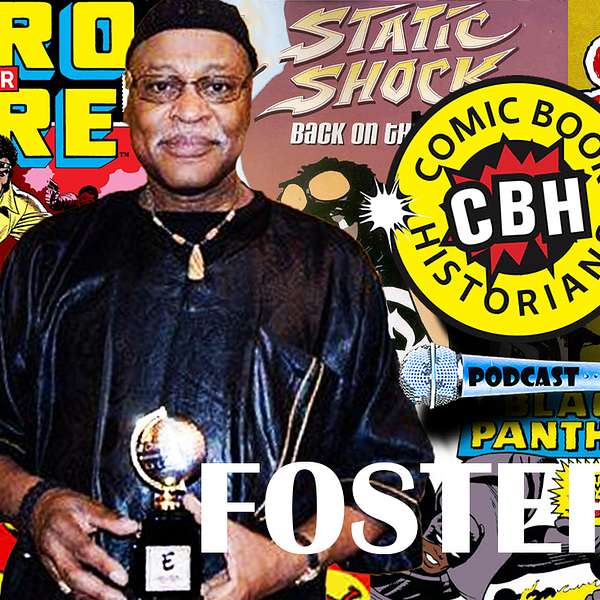
Comic Book Historians
As featured on LEGO.com, Marvel.com, Slugfest, NPR, Wall Street Journal and the Today Show, host & series producer Alex Grand, author of the best seller, Understanding Superhero Comic Books (with various co-hosts Bill Field, David Armstrong, N. Scott Robinson, Ph.D., Jim Thompson) and guests engage in a Journalistic Comic Book Historical discussion between professionals, historians and scholars in determining what happened and when in comics, from strips and pulps to the platinum age comic book, through golden, silver, bronze and then toward modern
Support us at https://www.patreon.com/comicbookhistorians.
Read Alex Grand's Understanding Superhero Comic Books published by McFarland & Company here at: https://a.co/d/2PlsODN
Series directed, produced & edited by Alex Grand
All episodes ©Comic Book Historians LLC.
Comic Book Historians
Professor William H. Foster III & African-Americans in Comics Part 2 by Alex Grand & Jim Thompson
As featured in Roy Thomas’ Alter Ego Magazine, Alex Grand and co-host Jim Thompson interview Professor William H. Foster III, published comic book historian, former Eisner judge and award-winning museum exhibit curator on the evolving roles of African Americans in Comics. William discusses his early forays into reading comics in the 1960s and 70s, then goes into a fascinating discussion of the portray and involvement of African American characters and creators in comics starting from the Yellow Kid, Krazy Kat, Ebony in Spirit, World's Finest, Sgt Fury, Fantastic Four's Black Panther, Luke Cage, Black Lightning, Black Vulcan, Fast Willie Jackson, Robert Crumb in Zap Comics, Storm of the X-Men, Sabre, Hypno Hustler, Milestone Comics, Trading Cards, Captain America, Thunder and ending into present day comic books. Originated, Edited & Produced by Alex Grand. Transcript available in Alter Ego 174.
Images used in artwork ©Their Respective Copyright holders, CBH Podcast ©Comic Book Historians. Thumbnail Artwork ©Comic Book Historians. Music ©Lost European
Alex: Ha, that’s a good one. And then the recent Harvey Birdman Special, Black Vulcan became President of the United States, actually.
Professor Foster: You’re kidding.
Alex: Yeah. Did you watch that?
Professor Foster: No!
Alex: You should check that out. It’s fun… Like 2019, or recent. Yeah.
Professor Foster: Oh, excellent. Thank you. I’ll be looking for that…
Alex: Now, Black Vulcan is Black Lightning, right?
Professor Foster: Yeah.
Alex: Just so everyone knows this. But just for the show.
Professor Foster: And I can’t understand what happened, but I’m sure it was something legal.
Alex: Yeah. It was a legal thing with the name, yeah.
Professor Foster: Who did you have? Apache Chief?
Jim: Yeah.
Alex: Right. Apache Chief.
Jim: The episode is Apache Chief Episode, where he goes to a Starbucks and burns himself on a hot cup of coffee… And he can’t grow after that.
Alex: Yeah. The pain was too much.
[chuckle]
Now, when you read the Don McGregor Jungle Action run, did you enjoy that run? What was your impression of it?
Professor Foster: Okay, now I’m going to put some grain in my eyes, because I’ve known Don for a long time… The title gives some people pause, but he was always trying to treat people the character as a human being. And that’s what happened with Black Panther for a long time. People didn’t know how to deal with him, so he was kind of a background character. Is he a monarch of a country? Is he a superhero? How is he a person? At one point, I think he has a job as a teacher in a high school.
Jim: Yeah.
Alex: Yeah.
Professor Foster: So, they couldn’t really decide what they wanted to do with him as a character. And even to not very long before the movie came out… I was reading the book on a regular basis. But I couldn’t read any more because I couldn’t tell where it was going, they were… It’s very confusing.
Alex: You mentioned, Storm, the creation of Storm in 1975, Len Wein, Dave Cockrum. She became a strong female black leader. What was your impression of Storm? You mentioned, “Yeah, she has blue eyes, but still, it’s an African princess.” Tell us your impression of Storm, and why is that important?
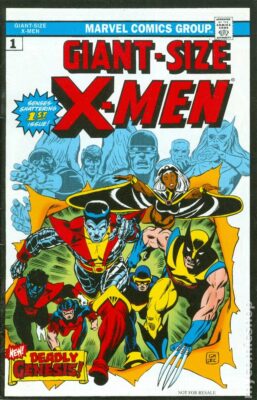
Professor Foster: I think it’s important because you never had anyone like her before. It’s interesting that when they did the amalgamation comics where they combine the Marvel and DC heroes.
Jim: Yeah.
Alex: Uh-hmm.
Professor Foster: Who does she combine with? She combines with Wonder Woman. And becomes Amazon, which tells you how powerful an image that she had, that that was a natural fit. That they didn’t have to explain that to anybody.
As they tell her story, that changes over time. She has an African mother, and an African-American father.
Alex: That’s right.
Professor Foster: She has been a thief in Cairo, as a young kid.
Alex: Yeah, because her parents were killed in an explosion.
Professor Foster: So, they’re adding elements to the story and then she becomes Kitty’s kind of like godmother. While she was a teenage girl, trying to make her way through, and Rogue, at the same time. So, she has a lot of different hats, she wears…
Alex: Yeah. She’s very developed. I mean, I like her character as a person. Because I’ve read so much of it.
Professor Foster: I never knew that she… I was surprised to see how much she called the Professor on ethical issues. And I thought that was important to have somebody like that because it’s you’re all powerful person, what’s going to stop you? As we saw in Jean Grey’s character, where with no governor, what happens? And that’s [overlap talk]
Alex: And also, since he’s in love with Jean Grey too, evidently. So, that gets weird.
[chuckle]
Jim: She’s sexual… She has a sexual aspect to her that a lot of time, black characters, even going back to then, are often neutered to some degree.
Professor Foster: Absolutely.
Jim: And you would have her taking showers naked… Having rain on her, and she didn’t really like to wear clothes, and didn’t fully understand it. That was highly unusual at the time, where the black character kind of tended to have a stick up their ass. I mean, they didn’t have that because people didn’t want to see that to some degree.
Professor Foster: Oh, hell no… You know, well they did want to see but not in the crowd.
Jim: Right.
[chuckle]
Professor Foster: But yeah, so no, you’re right. Now, you guys know that Wonder Woman had a black sister, right?
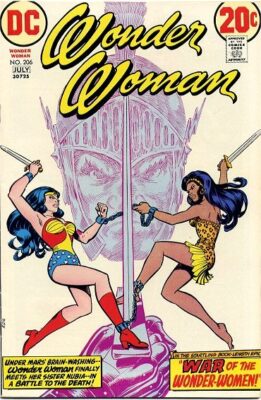
Jim: Yeah. Absolutely.
Professor Foster: Nubia, which who is like another person they didn’t know what to do with as a character. So, it’s like, I’d like to think or I guess I’m thinking, is that, because we have these unresolved issues of race, we’re going to always be dealing with that kind of thing in this country. Where the idea is that, “Well, she’s black but she can’t be this but she can be that. If somebody says she white, she’d be that, but she can’t be this.” We’re going to be working with that for a little while, I suspect.
But, It’s something that comic books can’t… Well, you can’t ignore it, but at their peril I think. I’ve dabbled in writing stories, and I’ve just began to appreciate that as it’s not as easy as it looks. Even if you go to the tropes that have been in place for decades.
Alex: Right. So now, later ‘70s, and this is an interesting thing you mentioned because you had an interview with Green. I don’t know if this is still a thing or if it was really a thing back then, but he said that when he was younger, being both black and an artist in the black community, they would think he was maybe…
Professor Foster: Gay.
Alex: Gay or something.
Professor Foster: Or creepy.
Alex: Or creepy or some different thing.
Professor Foster: Or creepy gay.
Alex: Not that those two words are synonymous to each other.
Professor Foster: No.
Alex: But just that that was what it was looked at… Was that a thing, first of all? And is that still a thing?
Professor Foster: It was a thing, and to certain people it’s still a thing. Okay…
[01:10:00]
Because I can… Gad, I can hear the voice in my head. Just when you were saying that out loud, someone was saying, “What kind of man wants to be an artist?”… Really. The kind of man who’s making more money than you’ll ever make in your lifetime. Okay.
[chuckles]
But nobody ever… The same people who tried to dissuade me from being involved with comic books because they couldn’t see a place where we’d make any sense. We had to be serious, we have to march to a certain drum. You have to get a job that has this kind of… Really. And if I don’t do that, then I’m a failure? I’ll tell you what, why don’t I define failure for myself. Not a disrespect for you… Oh, I’m sorry, disrespect for you… But no, that’s not the only way you can make a living.
And I have young people now, I have a number of young people who I’d like to think I’ve influenced to follow their heart did not make any dime, and they don’t care. And they’re doing fine. At least, as far as I can tell because, you know, how you doing?
But there will always be people who would say that this is not a wholesome lifestyle if you want to be an artist.
Alex: I see. Not wholesome. That’s the bottom line, I guess.
Professor Foster: Yeah.
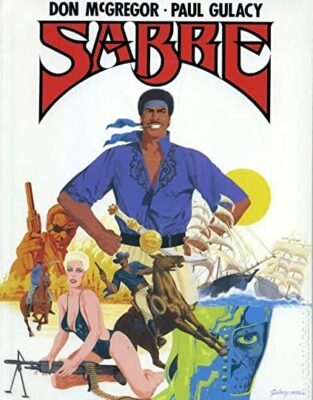
Alex: There are a couple of things that happened in 1978, comic-wise, in this aspect that we’re examining here today. In ’78, and Jim’s a fan of this as well, is Saber by Don McGregor, which was basically one of the earlier modern graphic novels; strong black adventure. But then at the same time, same year, you had Bill Mantlo’s 1978 story… It’s a Spider-Man story, the Hypno-Hustler.
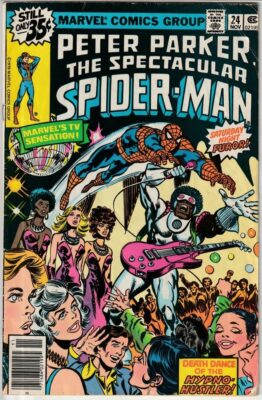
Professor Foster: [laugh]
Alex: Now, tell us what makes a… Just let the audience know because maybe the audience doesn’t know. What’s your impression of Saber versus something like the Hypno-Hustler? And why is one, maybe more successful than the other?
Professor Foster: Okay. Saber was basically, if you look at him, he’s basically inspired by Jimi Hendrix; there’s no question. And he spoke lyrically. He didn’t give a straight forward line, and it’s obviously post-apocalyptic wherever the hell that is. I don’t think it’s Earth. And he’s just… He uses his instinct, his natural ability, which we’ve always thought that was kind of a ’60s thing. We don’t always have to… He has a gun but it’s not the first thing he reaches for. He knows how to use a sword. The people who are after him, there’s no question that they have a hierarchy that they respect more than they respect anything else. They think of him as an animal, so he’s like an outsider. But he’s an outsider that you admire because he’s moving as naturally as he can.
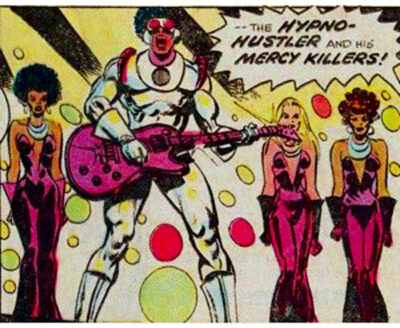
Hypno-Hustler [overlap talk] voted the worst supervillain in all of Marvel history. I don’t know who voted that but my vote would’ve counted on that too. Once again, somebody trying to take advantage of a trend, the disco era. And he’s introduced in the Spider-Man Comic, and literally, the outfit he’s wearing, only somebody who like you had no money, and you found some pieces somewhere and you put them all on, that would be him.
[chuckle]
But that’s okay. You got to stumble sometimes, so you can figure out what you’re going to be. I’m surprised you knew about that. That just kills me, man.
Jim: It says something though, about how far Marvel goes down in some ways. In terms of the major characters. Like they’re doing great stuff on the side. The Steve Gerber stuff and those things, and McGregor with Billy Graham, because we should mention Billy Graham, in terms of that too.
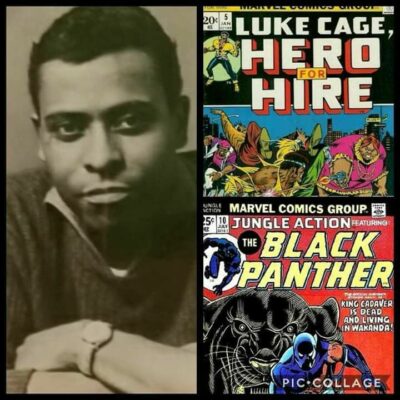
Professor Foster: Absolutely.
Jim: But besides that, what’s actually going on with the Spider-Man books, and with the Fantastic Four, and after Kirby leaves. They gunned down pretty bad because if you go to earlier Spider-Man… And I just want to say, the Prowler, that is a character that’s treated… Was that Hobie Brown?
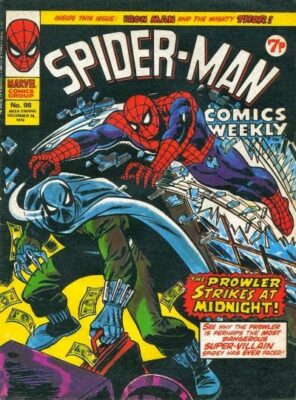
Alex: Yeah
Professor Foster: Yeah.
Jim: That character is treated with respect.
Professor Foster: Oh, yeah.
Alex: I like that character.
Jim: He’s a great Spider-Man, complicated character. And then, you skip five, 10 years, and you got that guy on the skateboard, and you got the Hypno-Hustler…
Professor Foster: [laugh] Rocket Racer.
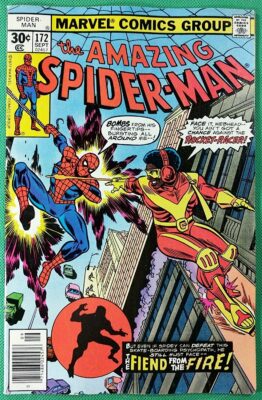
Jim: Oh, yeah. And they’re just awful.
Professor Foster: And It’s like they would really like… They’re fishing really hard to find somebody, you know… kind of crazy characters.
[chuckle]
Who was the guy in the giant wheel of death or murder…?
Jim: Yeah, the Big Wheel?... Oh, he teams up with…
Professor Foster: The name is enough to warn everybody. The big wheel guy.
Jim: They’re terrible.
Alex: [chuckle] I wanted to mention Bertram Fitzgerald. His Golden Legacy series, his Fast Willie Jackson 1976, with the Archie-type art by Gus Lemoine. You actually chatted with him as well.
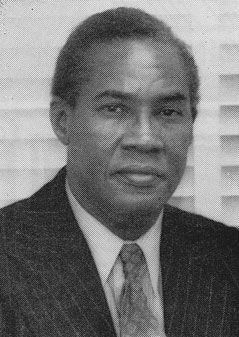
[01:15:10]
Professor Foster: Oh man, I got very lucky.
Alex: Yeah. So, tell us, what was he trying to do with Fast Willie Jackson? It didn’t go for a long time, tell us what led to its ceasing the publication of that comic.
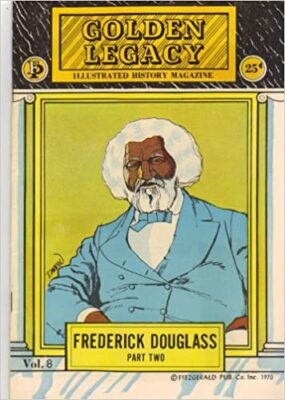
Professor Foster: No, problem. He started Golden Legacy because… The same reason that brother Evans started All-Negro Comics. He said, he got tired of not seeing black people in comics. So, he would dedicate an entire series to that. And he said, he was told by both black people and white people, “It will never sell.”
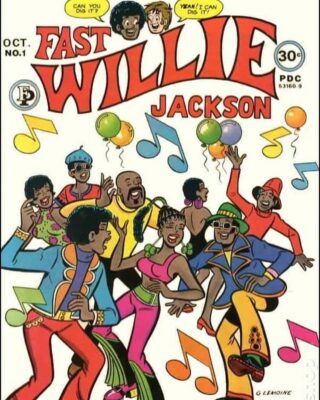
No one would sell him a subscription list so he couldn’t sell at newsstands where comic books were sold. But he act clever, and he got inventive. He went to grocery stores and got advertising from different grocery… Like Pepsi and Coke, and sold them there, and he started doing very well. He also submitted to the Urban League and got support. And those books were amazing.
By the way, it’s important to say, so unfortunately, he’s no longer with us. He passed last year.
Alex: Right.
Professor Foster: Crushed my heart because he was like… He had to go to and find his own printer, and a guy was stealing his designs, and selling them off the books. So, he had to take the guy to court. While he was at the courtroom, he had a heart attack.
Alex: Oh, wow. Okay.
Professor Foster: Went to the hospital, came back out, and still won the case. So, what he was looking for in the Fast Willie Jackson was a book that he could kind of trace to see… Because he wanted something for young people. He said, “How can I chill out their reading this?” So, they used a contest in the Letter to the Editor page, and said, “If you can come up with a good ending for this story, we’ll use your story.
He said they got an amazing amount of letters coming back to them. He said it was an important thing for him to try out. And it was so different from Golden Legacy. And he particularly said, “You got to set the Archie art, which everybody recognized.” The Omaha… and those are becoming increasingly hard to find now, sadly.
Alex: Yeah. I managed to find one issue on eBay. The only affordable one I could find, yes.
Professor Foster: I’ll tell you what, talk to me, I’ll hook you up later… I know a guy.
Alex: [chuckle] So now, in the ‘80s, there’s a few things you mentioned like Daddy Cool in 1984. But it seems like it’s not as much, as the ‘70s and the ‘90s. It’s almost like there’s less of these in some way.
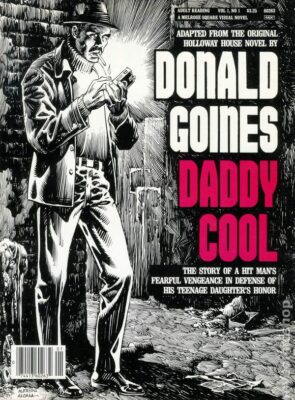
Professor Foster: Absolutely. I think it had to do with the economic conditions of the country at that time. And also, the political feeling on what was happening too because the Reagan years… [chuckle] It was interesting.
Daddy Cool was deep, that it was printed by the same people who did Player Magazine. Which was, how should we say it, adult entertainment?
Alex: Yeah. Oh, okay. Cool. I’ve heard of that.
Professor Foster: And they were the large sized…
[laughter]
It was a large sized format, and they reduced it later on, into a paperback size. But the person who reduced it wasn’t paying attention; the page count was all off. It’s like reading a Japanese novel at a train station.
[chuckle]
But it was an amazing story, and for people who had never read Daddy Cool because he wrote a lot of novels. He was very popular. If you can gauge the popularity of somebody who’s writing like pretty much for the underground. But it was an amazing book, and I got my copy years ago because I saw it some place and I said, “I got to do better.” And I picked it up, and it wasn’t back in print for like 20 years.
Alex: Yeah, that’s cool.
Professor Foster: So, if you see one of the little paperback copies, let it go. Trust me. You need to do better.
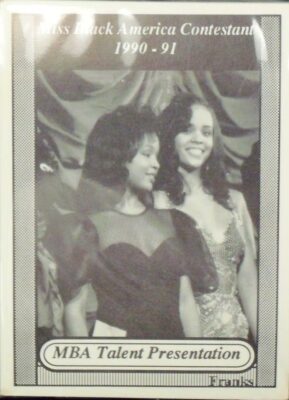
Alex: [chuckle] But the ‘90s is a really interesting time…
Professor Foster: It comes back strong.
Alex: Yeah, it comes back really strong. And also, it’s not just comics, you also mentioned cards, right. And there was a big thing in the early ‘90s. where card… Even Marvel hopped on the bandwagon with their Marvel Comics Cards. There’s a huge card industry, even I think, Revlon that bough Marvel also bought a card company. Like there’s this big thing for cards.
And you mentioned that there was a 1990 Miss Black America Trading Cards, the 1992 Civil Rights Movement Cards, 1993 African-Americans History Cards. So, tell us about the card market with this topic. And did you know about it at the time or was this more of a later thing?
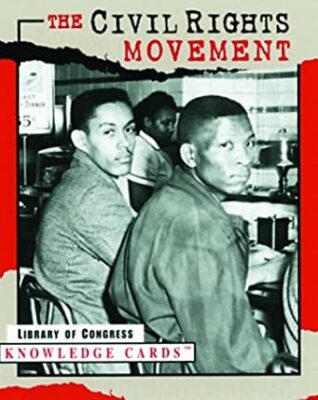
Professor Foster: I found out about it at the time, because I taught a summer program at college, for kids who want to…
[01:20:03]
If they took the summer course, they would get a leg up for when they decide if they want to go to this college or this school, it’s a nice idea. It was great. And my students told me about these trading cards. I was surprised.
I was a comic book guy, but before the summer was out, I had 3,000 cards. And majority of them were like, mostly superhero, but other things as well. I was stunned to find that set of Miss Black America Trading Cards. But it was a promotional device for a lot of places. So that’s what they got into. Even in… What’s wrong with me?... The Milestone.
Alex: Milestone Comics, that’s a whole other thing. Yes.
Professor Foster: Oh, god, the…
Alex: And Dwayne McDuffie and those guys, yeah.
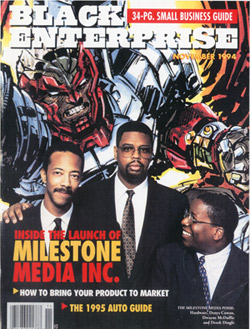
Professor Foster: I was going to say, a story about Dwayne McDuffie, when he initially went to Marvel… Just a passing story…
Alex: Yeah.
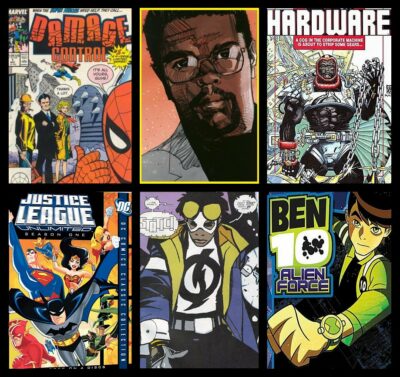
Professor Foster: He said, “Give me control of your worse selling book, and I bet you, I’ll turn it around.” It’s exactly what he did. The worse selling book was one about, after all the fights with superheroes and gods, and warriors, and demons and stuff, there’s always a mess in the city. Who is the company that came through for cleaning?
Alex: Damage Control, yeah.
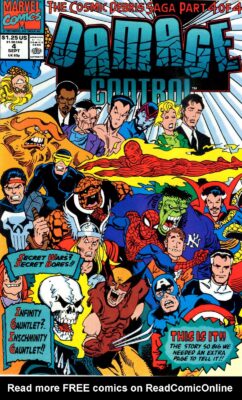
Professor Foster: That was the book he took. And I said, “I’ve never heard that…” But once he told me, that, I just said, “Now, I got to read it now, because you…”
Alex: Yeah. I never thought about looking at it that way. So, I’m going to go back and look at those again.
Professor Foster: [chuckle] But yeah… I was stunned. And Milestone has such an interesting story. Here’s the thing that some people got caught up in and they kind of got smacked hard, some people would tell the plot of their characters on the cards, and no comic book. So, the idea of, how did you get the card, you couldn’t buy a set. You had to buy them five or six at a time.
So, the idea was, we’ll get all of this money, and then they’ll find out what the story is like. But then, you throw away a bunch of cards, you get a lot of copies, so no, that didn’t work out too well for some folks. But other people said, “We’ll do both. We’ll tell the story that’s in the book, or we’ll start a brand-new story, so you can keep up with it, and then, who was it… Shadow Hawk.
Alex: Shadow Hawk.
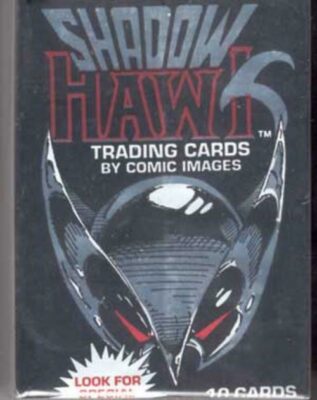
Professor Foster: Had the cards, that every nine of them, formed a picture. And that’s how the cards went into the book. They were smart. But I love getting my favorite characters. I got Wonder Woman, I got Superman, I got Batman, and the more I got them… Oh, I’m sorry, I got to mention Storm, and god knows, do you ever get enough Storm trading cards.
But I can say, that’s probably how I got my 3,000 cards. But I loved that. Let’s face it, for a young fan, they make a perfect gift. It’s not like I’m giving them a book, where the parents can say, “Well, we have to check this out.” You can see plainly on either side, what’s on the story, and it’s not going to be a problem.
So, for a person like me who like to encourage young people and not look creepy, so that was exactly what those, you know, they turned out to be. They turned out to be a perfect way of reading a little piece about the character.
Alex: Yeah. That’s right… Did Milestone achieve what they wanted to achieve?
Professor Foster: Ooh, interesting question. Yes… And no. Because…
Alex: [chuckle] Let us know… Yeah, tell us about that.
Professor Foster: [chuckle] Okay. It’s funny you should ask. It’s that they’ve got the presence, and the one area that was a difficulty and still is difficult, for all African-Americans comic book publishers, distribution. If you don’t have any distribution, you pretty much going to… Even if you’re online. It’s not the same.
So, DC said, “We’ll cover that for you.” But then, as you should have suspected… You knew who Daddy Warbucks is, right?
Alex: Yeah.
Jim: Yeah.
Professor Foster: Little orphan Annie. Okay. Daddy Warbucks may look like a sympathetic old guy but he never was going to let go of the reigns. He don’t care what you think. So, DC was always… “Well, no, you can’t put that stuff in.” “Wait a minute.” Our contract clearly says that… “ “Now, well, we say no.” So, it becomes that.
One story, I don’t know if I’d wrote about it… Dwayne McDuffie wrote it, the lightning character…
Alex: Static Shock.
Professor Foster: Has a girlfriend and they’ve decided they want to have sex, so that’s the story. Okay?... Now here’s the thing, DC didn’t want them to show a condom, and McDuffie said, “Wait a minute, if I have had an image of her and I said put her butt in a prominent image on the front cover, you all would double the copies… You would’ve made twice as many copies.”
[chuckle]
And it was subtly done. It wasn’t like they were brandishing while putting them on, they were on the side table. But DC… And he said, the first time he found out about that is when the cover came out.
[01:25:03]
He said, no one talked about it before it came out, and they had an extra cover on top of it, and then you open up and then you saw it. But you couldn’t do it on the store. And he said, that’s was pretty much it for him… They wanted editorial control over something that they really… That should’ve been made clear to everybody. I get the feeling it wasn’t. But then, how often does that come true with a partner. You think we understand each other, but somebody would get, “Oh, I’ll get away with what I want it…” That’s always going to be a nightmare.
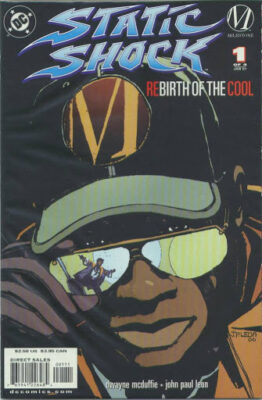
Jim: I want to talk about the success for a minute. My perspective a little bit in that, when I was teaching, I had Michael Davis come to the class… He’s something. He came. He’s one of the creators of Static. And I had a class of Duke students, and it was mostly white and I had two black students. When he came in and I introduced him in connection with Static, none of the white kids had any idea who that was.
One of the two black kids, the guy in the class, it was like introducing him to Elvis. He thought, Static… I mean, he explained to me after, he said, “You have no idea how important that character is, to me.” And I’ve since talked to… So, every year, I would ask any of my black students. I’d say, “What about Static?” Because I would talk about superheroes. And that character’s enormously important to kids of an age that they were watching the TV show.
Alex: Right.
Professor Foster: Absolutely.
Jim: It was huge.
Alex: Yeah, he had a cartoon for three years or something, right?
Jim: Yeah, and it was big, with the black community.
Professor Foster: Didn’t they won a Peabody?
Jim: Yeah, I think it did.
Professor Foster: If I can say this, and nobody gets offended, he was like the black Spider-Man.
Jim: Yeah.
Alex: Right. That makes sense.
Jim: Before there was a Black Spider-Man.
Professor Foster: That’s true.
Alex: That’s true, yeah. That’s a good comparison actually. Yeah.
Now there’s some other ‘90s milestones which we talked about the Dwyane McDuffie stuff. Barry Crockett Motown Man 1999, then there’s also this book that I actually find, it’s difficult for me to find. I was trying to find it, A Cartoon History of African-Americans, chronicles history of blacks and Americans starting in 1619. And it’s like a visual or cartoon history of that. And you mentioned that in your book. That came out in 1997.
What was the energy of the ‘90s to suddenly bring out such an awareness, and such a curiosity about this?
Professor Foster: Oh, my brother, I got two words. Personal Computers.
Alex: There you go…
Professor Foster: Because now...
Alex: Internet.
Professor Foster: Yup, absolutely. And you could write, you can have a program that could draw, and if you had the internet, you could distribute. And you don’t have to wait in line because somebody… Remember back when, there were basically two, but there were maybe five comic companies, and you knew they took what they wanted, and they didn’t what they didn’t. And they hired guys to write what they wanted them to write.
So, any kid who wanted to write a comic book… You know, you’re doing it on the paper that comes with your mom’s nylons, and you’re rolling them off on that roller press thing. But now, your own hand. And then, from when I got involved, with the IBCBP the group of independent black comic book producers that was just amazing. And it has become an important network, and in fact, it mirrors a network that was in place when the Black Pullman, and black press kind of cooperated. Certain towns wouldn’t take black papers, and the Pullman would grab a bunch and throw them off when they knew somebody would pick them up. So, they kind of defeated that kind of thing, where you’re not going to get the news in many places.
That was the same thing. When people realized that I can cooperate with somebody else other somebody else, other than the big guys, and still get my job done, and be creative… That was what the ‘90s was about.
Alex: Wow, that’s cool. Yeah, because that’s what happened to TV channels as well, right? There was like three networks at some point, and then suddenly, the internet just changes everything, where they don’t have all the control and knocked the whole filter on everything anymore.
Professor Foster: Absolutely… Such is interesting that that happened to them because that’s what movies had, until TV came in.
Alex: Yeah, right. Exactly. And actually, yeah, and comics almost kind of had that before TV even.
[01:30:00]
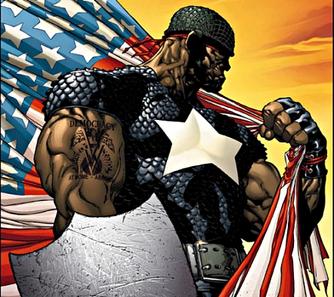
Now, in 2003, a couple of things happened in 2003 that you mentioned. There was, basically, a Black Captain America, and it was a commentary on the government experimenting on African-Americans. Also, in the same year, Thunder is created, Black Lightning’s daughter. It seems like these things are happening in clusters or something. But tell us about those two characters. Why are they important going in to the twenty-first century?
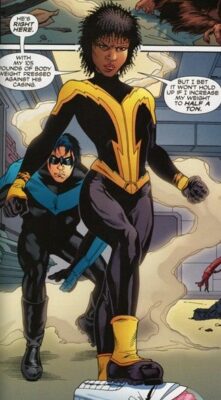
Professor Foster: Second generation superhero, been kicked around a little bit but not really done. But then, you find that they do it and it’s an African-American family. And then, of course now we had it as a TV show… Just amazing. Because they could have done any number of ways with that because the characters have been around for a little bit.
The first one that you asked me about, I’m sorry, go back for a second.
Alex: Oh yeah, Isaiah Bradley is the Black Captain America, and the commentary on government experimenting on African-Americans. Tell us about your impression of that character.
Professor Foster: Sure enough.
Jim: The truth was the series, right? The [overlap talk] was the truth.
Professor Foster: The Kyle Baker…
Jim: Kyle Baker.
Professor Foster: Tuskegee Experiment, which a lot of people still don’t know about where black prisoners were told they were given a cure for syphilis and gonorrhea, and in fact, they were not. They were given nothing, not even a Penicillium. The idea was, the goal of the experiment was to see what would happen, the results would be the syphilis would be in the human body for 30 years. And they all died horribly.
So, someone said, what happens if the super soldier serum, given to Captain America… You really think that was given to him without trying it out on black people first. And that was the is about. That Captain America is the benefit of having abused some black guys… To see how it’s going to work.
And the fact that they made it a part of the continuity of the Captain America’s origin for all time, stuns me beyond words. I think that’s amazing, because I’m a DC kid, and how many years did I have to put up with imaginary stories, or stories that could’ve happened? It just seemed like a cop out but that’s what they did. They said, “Nope, this is how we’ll always going to play it.
Alex: Yeah, this is the canon. This made it in. Yeah.
Professor Foster: Because somebody had some… I’m not saying that everybody else was a coward, but somebody took a chance. It does not always have to be pretty and in the light. Sometimes, it’s in the dark and we can still do some good stuff with it.
Alex: Sure… So, Jim probably has some final questions as well. But tell us about your exhibit, The Changing Image of African-Americans in Comic Books. And tell us about that experience for people that have seen it.
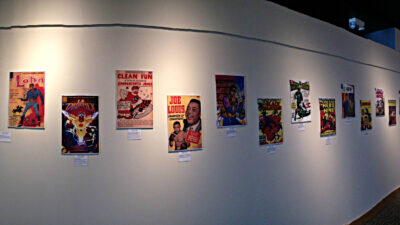
Professor Foster: It has grown exponentially, from when I first started. I didn’t have a lot of images in the beginning, and now… I used to have to take the physical pieces out. I stopped that. Then I used to do it on slides, now, I can do it on PowerPoint, which is great because I can include as many slides that I want to, I can import them if I need to, and nothing is imperiled.
But the idea of, if you don’t see it, you don’t know it. How many of you have never… Like he was saying, he’s students have never seen Static, and they didn’t know who the hell he was. Thank you for TV, thank you for movies now, you can’t say you haven’t seen… Think about like a media darling, and like a media phenomenon like the Black Panther. Around the world, billions of dollars are made… Sequel coming, couple of sequels coming. We know it’s coming.
Changes in nature on how these characters exist in literature and in media, and in legend. Superman has been around what?... Since 1938?
Alex: Yeah.
Professor Foster: It’s like, you don’t even need to speak in English to recognize his symbol. So, the same thing is happening for black characters, and them being not just uniquely associated with United States, they have black superheroes from every part of the world. You got to love it. And not just black, you have Israeli superheroes, we have Italian super heroes, we have Irish superheroes… Thank you Marvel for that.
And then also, when they made the international X-Men in 1975, they have… Who’s the guy that uses his voice in the X-Men?
Alex: Oh, yeah, Banshee.
Professor Foster: Yeah, from Ireland. You got Kurt (Wagner) from Germany…
Alex: Yeah, I love that whole era of X-Men.
[overlap talk]
Jim: A Native-American for two issues.
Alex: Yeah, Thunderbird. He kind of gotten taken out quick though… Count Nefaria…
[01:35:02]
Professor Foster: I thought his brother took over.
Jim: He does, eventually his brother comes.
Alex: Well, his brother came in later, like in the late ‘80s. Right… In New Mutants.
Professor Foster: Okay… Oh, did they kill him too?... Sorry, that’s terrible.
Alex: No, he’s still doing… [chuckle] “Did they kill him…” No, he’s still around.
Professor Foster: That’s wrong. Excuse me… Forgive me…
Alex: Yeah, he was actually like, I think, three times stronger than his older brother. James Proudstar…
Professor Foster: Ooh!
Alex: Yeah.
Jim: Yeah, Forge, also.
Alex: And then you have Forge, who I thought was actually pretty cool. Him and Storm had a thing going on, for a while there. Yeah.
Jim: Yeah, he’s a good character.
Professor Foster: Who was the young girl, of the Native American outfit, she did something with the spirit or something?
Alex: [chuckle] What…? Is this the Legion of Superheroes character or…?
Professor Foster: I don’t know. I thought it was the X-Men. I’m not sure.
Alex: Oh, no, maybe Alpha Flight, Talisman?
Professor Foster: Yes. Thank you.
Alex: Yeah, and then they had her dad, Shaman, right?
Professor Foster: Yeah.
Jim: Yeah.
Alex: He had the bag of leather, and then a demon head would pop out and he would be like, “Whoa, well, let’s put that back in.” Yeah.
[chuckles]
Professor Foster: If we don’t have a sense of humor, this would all be wasted… But yeah, it’s interesting, maybe by my influence because I used to love the Legions of Superheroes… Young Mutants, never so much. But the Mutants were pretty young, pretty much [overlap talk].
Alex: Right.
Professor Foster: I did a comic book with a friend of mine, and he’s Native Americans. It’s the first, as far as we know, African-American-Native American superhero team. And it was just fun to do… We’re thinking about bringing it someplace else, and we’ll see what happens.
But no, that’s a good trend for some people. That’s too much for some folks, I got that. I will use this, in the best possible way. If you’re used to white bread, then rye or wheat, probably makes you crazy.
Alex: [chuckle] What about you, Jim? Are you a wheat bread kind of guy or what?
Jim: No, I’m rye.
[laughter]
Jim: I’m rye all the way.
Professor Foster: See, I would have called you for a pumpernickel guy.
[chuckles]
But I think the biggest thing is that, when I take my exhibit out, everybody shows up. I have a part of it that I do, basically, just for people who are from older generation, and talk about Krazy Kat, and talk about Woodie Woodpecker, because I said, “You guys remember these characters?” Man, they’re jumping on it. It’s like you’d think I was in a room with 15-year-olds.
Alex: That’s awesome.
Professor Foster: That’s exactly why I do it, because, you think that you don’t have anything in common with another generation, you absolutely do. Okay…. Oh, by the way, you talked about the public service ads…
Alex: Yeah.
Professor Foster: I just recently, did some pieces about, Joe Palooka doing one. Frank Sinatra doing one. They went pretty far. A few had made sure that there were people that would listen. This is an important message…
Alex: Yeah. Now, coming in to the present time, do you feel that this is an interesting and exciting new era? How do you feel about it when they have characters now, where they have representation? Do you feel like it’s been well done? Do you feel like it’s driven by some sort of like, “Okay, well we need to make a race based character, and we’ll do this.” Do you feel like it’s artificial? Do you feel like it’s genuine? What’s your impression? Since you have the whole gamut of seeing how this whole thing’s evolve.
Professor Foster: Sure enough. Something to think about something too is that we have a former US President who is represented as a superhero in any number of comic books.
Jim: Yeah.
Professor Foster: And that’s like amazing. All he said was he was a fan of comics, and that’s all comic book makers had to hear. And now, he’s represented as Superman in several different dimensions. I think that’s amazing.
Jim: And the Spider-Man cover with him, his head on this… I’ve got that on the wall.
Professor Foster: I think it’s an important time. I think there’s always a chance of somebody’s doing something for money as oppose to for a better reason. And that’s just the chance you take. And in case something be done badly, even when you’re striving for good intentions, absolutely. But I’ll take a shot. I’ll take a shot.
My goddaughter and I, we never miss an opening of a superhero movie, and we’re having the time of our lives, literally. She’s a lot younger than I but it’s like we’re both kids. And we go to matinees so nobody else is there so we could be as loud as we want. I love that. Because that’s what I did when I was a kid.
[01:40:00]
The movie, and the people you saw in the screen… This was not the time to be quiet, it’s a time to be exuberant. And that’s part of what youth is about. I think, if comics ever captured that or keep that, we’ll be okay. I think that one day, when a story has to be this way because a computer or a… What’s the thing that they use to predict behavior?... They’re doing it now in computers… Gad, I just saw a program on it… In fact, they used it in one of the Marvel movies, to figure out who they need to get rid of because based on how they’d acted, we could predict the future.
Jim: Oh, yeah! In Avengers, they figure out… Was it going back in time, when they were figuring out… It was something they did… I know what you’re talking about.
Hey, Alex, I got five questions, pretty random.
Alex: Go for it.
Jim: I would go with those now?
Alex: I think so.
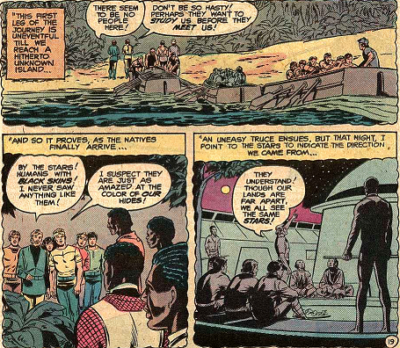
Jim: First one, which is brand new and it’s only because you brought up the Legion of Superheroes. What was it about, in the ‘70s, putting all the people on one island? Because both, in terms of Tyroc, on Krypton they had the Vathlo Island where the black scientist’s home… When you were reading that, did you say, “All right, I’m happy to see something but this is [chuckle] crazy.”
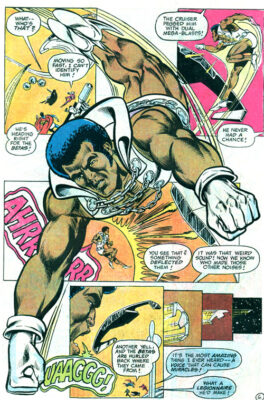
Professor Foster: No… No. Kryptonian segregation and I’m going to call it just what it was.
Jim: Yeah, it wasn’t good. And they never knew what to do with Tyroc either. I mean, he comes, and “Hey, there’s a black Legionnaire”, and then it’s like, nope, he’s gone.
Professor Foster: Yeah, get him a new tailor would have been the first they needed to do. That outfit was “pffth” weak, get out of here.
[laughter]
Don’t walk in my neighborhood wearing that towel. Okay. What’s interesting that gets me is that the first map of Krypton, shows the island of the Blacks, and they all got these monstrous afros. It’s like the mid-‘60s.
Jim: Yeah. I was just talking about that just recently. Because nobody remembers that.
Professor Foster: I do.
Jim: I have the map, and an issue or two earlier, there were those characters. And they’re shown on like a television screen, checking in with them, with the scientists. They’re all kept on an island.
All right, second question, but along the same time period. I have talked to a number of black artists, that respected Jack Kirby, for not drawing white people when he’s drawing black people, and trying to actually make them look different. I wanted to ask you about… They just recently published his Soul Love, romance comic book.
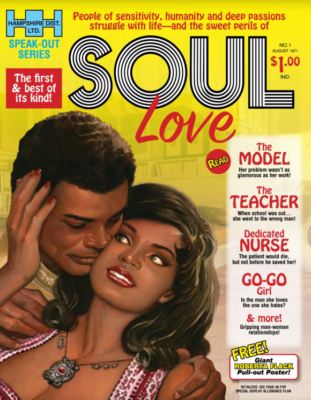
Professor Foster: Get out of here! No, they did not!
Jim: Yeah… No, it’s available.
Professor Foster: Oh, man.
Jim: And I wondered what you thought of that, and what you thought of “Flipper Dipper” and the Black Racer. Kirby attempting to do this is great and I love him. But what’s your thought on his DC stuff there.
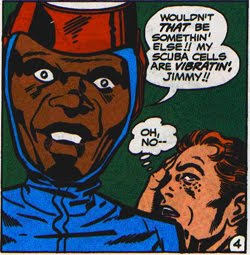
Professor Foster: I think about it this way. Sometimes, you go to the dog pound and you want to bring home a big, big boxer or a German Shepherd, and you bring home a poodle.
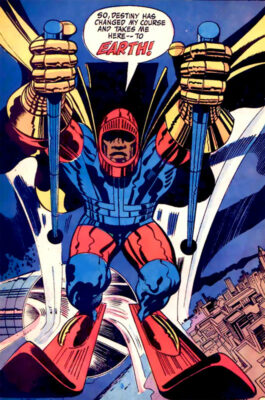
[chuckles]
Because nobody knows. It’s the most vicious poodle in the room, but nobody knows. Okay. So sometimes, you just hope against hope.
But, no, thank you for telling me about that Soul Love. I’m going to do my best to find that, because I saw the Kirby magazine where it’s showing some of the pages from that, and I’ve never seen that. I said, “You mean they were planning to do a black love story?”
Alex: Yeah. It’s like ‘1971.
Professor Foster: Other than that, because if he wrote romance like that…
[overlap talk]
Jim: It’s amazing.
Professor Foster: In the early ‘50s, and that was the last time you saw that.
Alex: The cool thing you’ll like about it, because I have it, TwoMorrows published it. The people who make the Jack Kirby Collection, they published this Soul Love. And they have Jack Kirby’s pencils, but painted by Alex Ross. It’s actually really nicely done, so you’ll really like it.
Professor Foster: I’m sure I’ll do. Thank you, gentlemen. Now, my birthday wishes have come true.
Jim: All right. I notice in our conversation that we talk more about black characters and black comics, than we do about black creators… Trina Robbins did one on women superheroes. And then most of the rest of her work were on women creators. Do you have other work in mind? Are you going to do more on African-American comic creators at some point?
Professor Foster: I would love to. It’s… It’s one of the banes of my existence, it’s that it’s just hard to get to people. I got a big list of people. In fact, I’m going through my research piles now, but its…
[01:45:01]
And then… And this is not a shot to anybody, it’s hard to get to the rights to publish people. Because I understand how it is when you are like, underfunded; you think everybody’s trying to rip you off. I am not. But that surely sounds like what everybody says. But there’s a bunch of them, and I’ve been in touch with them since late ‘90s. And I’m keeping track of as many people as I can. The opportunity I’m reasonably certain will make itself present. And I’m going to chase it down.
Jim: And along those lines, I want to segue into a couple of names of people that I have a special affection for. And the first one, is somebody I know. Alex wrote about two. I’m interested in it because I’m interested on Chalk Talk during that certain period, especially in terms of religion.
Elton Fax. Do you know of his work?
Professor Foster: No.
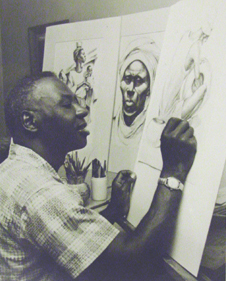
Jim: He was an African-American comic artist that went and did a lot of WPA stuff, and LG…
Alex: An he did some western pulp art and stuff too, and a little bit in comics, I’ll tag you and add you on Facebook.
Professor Foster: Thank you.
Jim: Yeah. And he used to do Chalk Talks too… So, look up, him because that’s interesting. He’s fascinating, in terms of his history.
Let’s talk just briefly about Matt Baker and his contributions, because he seems like somebody that ought to be covered in far more depth than he has been
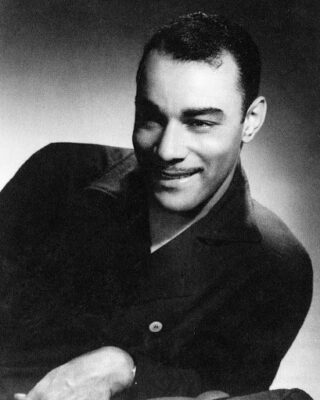
Professor Foster: Well, actually, you know that somebody put out a book about him.
Jim: Yeah… but you didn’t!
Professor Foster: I thought it was fascinating to that point… No. and somehow. I’ll bear the shame.
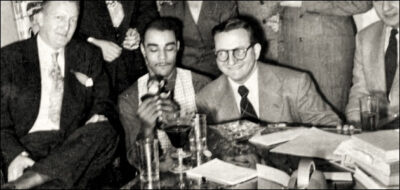
[chuckle]
But no, because I want to find out more about him myself… Somebody just had done some thorough research. Also, with who you mentioned, the creator of Torchy Brown, there’s a book about her out, which I was surprised to see.
Alex: Yeah, Jackie Ormes… Yeah, the Matt Baker book is good. I just finished that. Evidently, I don’t know if he’s family knew but he had these two best friends. I think one was an Italian artist… He had a lot of friends that were Caucasian, in the art field and a lot of them were Italians. And they were all buddies. Al Feldstein really liked him a lot, and they all worked in the same studio.
It was interesting. His closest friend who was an Italian guy, and who was a comic artist, say that Matt Baker was actually gay, which I didn’t know, because he drew women so perfectly.
Professor Foster: No fooling.
Alex: But also, that he generally wouldn’t really talk too much about race, when he’d hang out with a lot of his friends. He was just very excited, and like enjoyed the culture of the moment a lot. But evidently, his Italian friend wanted him to be his best man at his wedding, but he didn’t want to put them in that position, or something like that. It’s actually kind of sad because even the Italian friend and his wife were both like… It was like a depressing theme that hovered over their wedding, that he opted out of being their best man because of stuff like that. It’s really interesting stuff.
Professor Foster: He didn’t want it to turn into “the thing” of the wedding. I got it. I’m feeling it.
Listen, for both of you guys, AC Hollingsworth.
Jim: Oh, yeah.
Professor Foster: I love his work. And the fact that he turned into a fine artist, starting as a cartoon artist when he was 15… Just an amazing story. I own some of the original pieces of his work but I… Only because I was paying attention when some other people were not.
Jim: Oh, wow. That’s great.
Professor Foster: It’s very hard to find.
Jim: All right. A couple of other…
Professor Foster: Go ahead.
Jim: I want to get your feeling about, the era we currently live in of tremendous archival republication just putting things back and make them accessible, that haven’t been in a long time… The subject that I want to ask about is the one that didn’t happen, which is Captain Marvel and the Monster Society. It didn’t happen because of worries about the black representation, of the one character. And when we’re doing this historic art stuff, how do you feel about, should the character be altered, cleaned up?... Those pages somehow… Central to the story line to limit it, or should it just be all out there.
I would normally say all out there but when you get to something that’s so obviously going to have a children’s market… I’m just curious what your feelings are.
[01:50:00]
Professor Foster: They made several for TV movies about the Spirit. Several. And interestingly enough, the Ebony character was much more palatable, and he was sharp, and there was nothing that anybody could complain about. So, to modernize the character, I got that. To try to bring it back in the old days in this day, won’t work then, it won’t then no, it doesn’t work now. They tried that with Amos ‘n’ Andy, on the radio. Two white guys imitating black people, who knew. But when it came into the TV show, this is the biggest conversation I had with my students about this. I said their parents would say, “Look at all the black professionals being shown on Amos ‘n’ Andy”, lawyers, doctors, judges, okay. But look at the parody of who we are overall. So, which would you rather have?
I feel confident and confident enough to speak that for myself, but not for anybody else.
Jim: Amos ‘n’ Andy’s horrid. Because my wife is a TV professor. She shows it in class, some aspects of it, and you’re both horrified and but the fish is funny. I mean the lines are funny, and it’s very tricky, specially you’re doing it in front of students. And the mix of how the reactions are, it’s a tricky business for sure.
Professor Foster: It is… I taught diversity as a diversity counselor and consultant for years, and the thing that we would ask somebody was, is would it be funny if you changed the race of the people who were saying it… That kind of helped.
Jim: No. That’s exactly right… My penultimate question, history… Comics are an interesting vessel for telling black history. And that’s been especially noticeable in the last decade. And the two books I want to talk about would be the Hip Hop History Family Tree, and March.
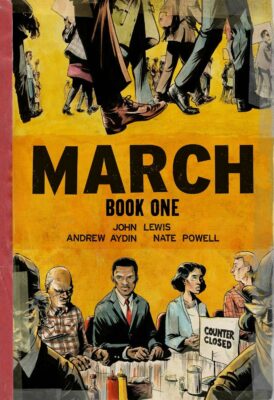
Professor Foster: I interviewed one of the authors of March. We got on the phone and truly, we must’ve hit a common chord because we must have talked two and a half hours. And Hip Hop, I was on the Eisner Awards I think, when that won an award. So, I was very impressed with that. The work was amazing. And it wasn’t like anybody else could have done it that same way. Which means, if somebody else want to do it in a different way, they most certainly can.
And like most hip hop artist, they have their own take on it, when they were introduced to it, what influences they had. I think that’s real important. And comic books suggest an excellent way to introduce somebody. I mean, Hip Hop is an international media thing now. There’s hardly anybody who can’t get with it.
Jim: And it’s an amazing time when both in terms of comics, and TV documentary, you can do so much, with black history, from different voices in ways that really, really weren’t available for a wide distribution in earlier days.
Along with that, in terms of fiction, I wondered if you have… If you’re up to date on certain black creative teams, and books, and specifically, what’s going on in something like, Bitter Root, right now.
Professor Foster: Oh god, yeah. Big fan.
Jim: I was hoping you were going to say that. Can you talk about that a little bit because I’d like listeners who don’t know that comic, and a lot of them don’t, and maybe in the same way that my students didn’t know Static. I think there are people that don’t gravitate to that, and it’s a fantastic book.
Professor Foster: I don’t… It’s interesting I get toured for so many different levels because I see different generations represented. First of all, I love what they was being done with the color foil and the paging, and how they put it together. I just liked it. It’s… you know. I think somebody else did themselves a chance… Do what you were doing if you had a book report due. Run over to the local bookstore, and flip through the pages, see-look before you buy it. But you’ll want to keep reading. So I’m going to treat books that way.
Jim: The writer, Walker, did work on Shaft and some other books, and Sanford Greene was the artist on Power Man and Iron Fist, the recent version. So, it’s an all-black creative team which doesn’t really come along all that often.
Professor Foster: Yup… But may…
Jim: And it’s some great work.
[01:55:00]
And got an Eisner recognition this year. Yeah.
Professor Foster: Yes… See, and that speaks to… Because I’ve been on that committee and it’s… you know… It’s no poop butt. We’re working really hard to make sure… And sometimes, it’s not an easy choice but in this case, I think they made the right one.
Jim: When did you do it? Which year?
Professor Foster: Oh my god, ‘14? 2014, I think?
Jim: Ahh, that’s interesting. We’re friends with Michael Dooley, who did it last year.
Professor Foster: Ah! They usually pick out a really diverse team of people who come in, man… And it’s kind of intense, but it’s okay. And you’ll understand once you’ve been through, and you’ll understand exactly how serious it is.
Alex: I really enjoyed this because when I read your book, I already saw you in those two documentaries before so I knew who you were. And you’ve commented in our group and every time you did, even if it was a questionable character, you would chime in. And you always had something positive to say about… Everything you write is actually like there’s a positive side to what you’re putting. I always found that really fascinating, and I’d always study your comments. I’d be like, “Wow, that’s a great perspective.”
So, it was exciting for me to read the book and to also meet with you today. Thanks so much for joining us today. Jim and I had a great time.
Jim: Yeah, it was great. Thanks.
Professor Foster: Well listen, gentlemen, I had a great time as well. Oh, by the way, just to let you know, I’m negotiating for a third collection of essays, coming up. I’ll keep you guys posted.
Jim: Yeah. Please
Alex: Yeah. Absolutely... Now, what’s the second one called?
Professor Foster: Dreaming of a Face Like Ours.
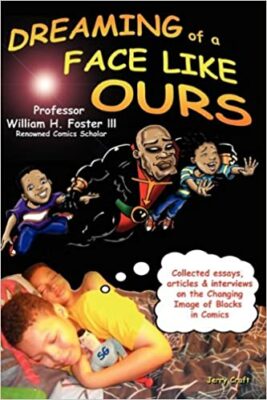
Alex: That’s what it was. Yes. And I haven’t read that one yet. I’ll read that one next.
Professor Foster: Thank you. Okay, now, you may have to go through me to get that one as well too. But don’t worry, like I said, I’ll hook you up. [chuckle]
Alex: Yeah, because the first one, I found on eBay, it was like 40 bucks or something. I’m like, all right, I’ll just get it. But the second one, I couldn’t find that one. So, all right, that’s cool. So, we’ll be in touch about that. That’s great.
Professor Foster: And gentlemen, thank you for working with me on the Zoom connection.
[01:57:07]
Join us for more discussion at our Facebook group
check out our CBH documentary videos on our CBH Youtube Channel
get some historic comic book shirts, pillows, etc at CBH Merchandise
check out our CBH Podcast available on Apple Podcasts, Google PlayerFM and Stitcher.
Use of images are not intended to infringe on copyright, but merely used for academic purpose.
Images used ©Their Respective Copyright Holders
Interview ©Comic Book Historians 2020
